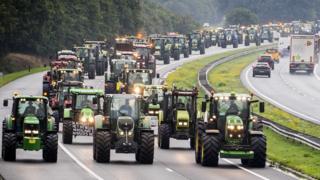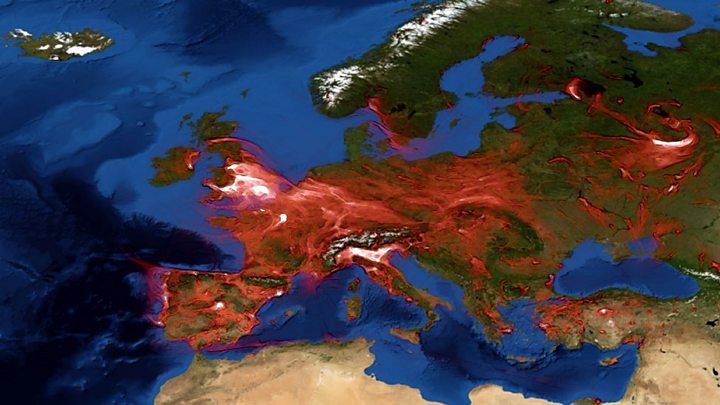Dutch tractor protest sparks 'worst rush hour' - BBC News
 Image copyright
EPA
Image copyright
EPA
Tractor-driving farmers taking to the streets to demand greater recognition have caused the worst ever Dutch morning rush hour on Tuesday, according to motoring organisation ANWB.
There were 1,136km (700 miles) of jams at the morning peak, it said.
Farmers reacted angrily to claims that they were largely responsible for a spiralling nitrogen emissions problem.
A report has called for inefficient cattle farms to be shut down and some speed limits lowered to cut emissions.
Farming groups believe they are being victimised while the aviation industry is escaping scrutiny.
How big are the protests?
Organisers were hoping for some 15,000 farmers to join a protest in a field in the centre of The Hague and tractors arrived early on Tuesday, knocking down fences to get there.
Three people were arrested, according to public broadcaster NOS, as reports said 500 tractors had already reached their destination at Malieveld an hour before the demonstration was set to start. Amid the placards carried by the tractors was one simple hashtag: "No farmers no food."
One reporter said Malieveld was already full and the tractors kept coming. Hague mayor Pauline Krikke warned of an "unsafe situation".
But the main disruption was across the country as tractors snarled up motorways and main roads. A convoy on one motorway in the southern province of Brabant swerved from left to right to prevent traffic getting past.
It was not just the farmers who took to the streets but their children too, as they headed to a Christian primary school on toy tractors in the eastern farming town of Ommen.
How serious is the crisis?
The Dutch top court, the Council of State, ruled in May that Dutch rules for granting building and farming permits breached EU law on protecting nature from nitrogen emissions, prompting a halt in thousands of projects including new roads, housing blocks and airports.

Media playback is unsupported on your device
Media caption Nitrogen dioxide air pollution 5-10 January (sequence is played twice)Last week an advisory committee said drastic measures were needed, both in farming and on Dutch roads.
Liberal MP Tjeerd de Groot called for livestock production to be halved, meaning six million fewer pigs and 50 million fewer chickens, prompting a furious reaction from farmers. He blamed intensive livestock farming for much of the Netherlands' nitrogen emissions problem and argued that the key to the future was modern, sustainable agriculture.
Farming groups believe measurement of carbon dioxide and nitrogen is inaccurate and the debate has been hijacked by city-based climate change protesters.
"We feel as if we're being put in the dunces' corner by city types who come and tell us how things should be in the countryside," one of the protest organisers, Mark van den Oever, told the Trouw website, adding that farmers shouldn't be blamed for the whole nitrogen issue.
Image copyright EPA Image caption Tractor drivers and protesters continued to arrive throughout the morning ahead of the Hague protestLast month, broadcaster RTL Nieuws reported that the worst pollution problems facing the Dutch were around Amsterdam, nearby Schiphol airport and Rotterdam.
The government has been criticised by climate campaigners for pushing ahead with the return to Formula One motor racing at Zandvoort next year. The sports minister said he was hopeful that measures to tackle nitrogen emissions would not affect the race.
The Dutch government has set a target of reducing greenhouse gas emissions next year by 25% of 1990 levels. Last month a health watchdog said emissions had been cut by 15% cut in that time, largely by reducing methane, nitrous oxide and other gases. Carbon dioxide levels have remained the same.